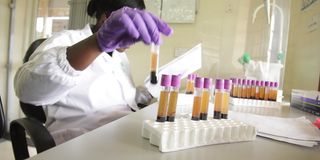Our call for action on drug resistance

A health worker analyses blood samples. Government should ensure adequate supply of diagnostic equipment and appropriate medicines, but also monitor to ensure proper use as well as periodically checking health outcomes in conditions where drug resistance is growing. PHOTO | FILE
What you need to know:
- The issue: Drug resistance
- Our view: Government should ensure adequate supply of diagnostic equipment and appropriate medicines, but also monitor to ensure proper use as well as periodically checking health outcomes in conditions where drug resistance is growing.
Experts have long warned of a looming crisis as a result of drug resistance among patients. The concern arises in two major areas namely; antimicrobial resistance and now reported increase in resistance to the Artemisinin-based Combination Therapy in the treatment of malaria.
This is amid a growing number of malaria cases, a reported average of 37,600 cases per day, up from 28,000 reported in April and May.
Target Malaria, a vector control alliance working in collaboration with Uganda Virus Institute, says malaria causes immense detrimental health effects and is responsible for 30 to 50 percent of outpatient visits and 15 to 20 percent of hospital admissions.
According to the National Malaria Control Programme, a single episode of malaria costs a family an average of $9 (Shs34,000) and a worker may lose 5 to 20 days per episode.
Repeated infections have serious implications on household income. The increased disease burden also causes a lot of suffering and many deaths.
With more effective diagnosis and treatment, the toll could be greatly reduced. Sadly, there are more people taking medication and not getting cured. This not only increases rate of disease transmission, it stretches resources available for treatment.
Cited among the causes of the increasing drug resistance is the wrong diagnosis by medical personnel and inadequate diagnostic materials such as in the case of the Rapid Diagnostic Test for malaria.
More investigation needs to be done and if indeed there is a tendency to intentionally dispense drugs that do not fit the patients’ needs, this ought to be cured. With the growth in number of private sector health providers, there is need to look out for any excessive tendencies to extract profit, which may endanger lives in the long run. If some medical professionals are speaking out, then there is a basis to pay keen attention to this matter.
Timely and adequate provision of diagnostic equipment and medicines to all facilities countrywide, as well as extending the full range of health services closer to the people, could rule out problems arising from intermittent treatment and self medication.
The drug resistance is occurring because patients are not getting the full and appropriate course of treatment in the first place.
Government should ensure adequate supply of diagnostic equipment and appropriate medicines, but also monitor to ensure proper use, as well as periodically checking health outcomes in conditions where drug resistance is growing. Public sensitisation on treatment is also key to ensure compliance to treatment regimens and to prevent abuse of drugs.




